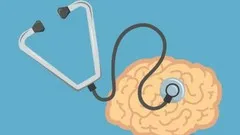
Music as Biology: What We Like to Hear and Why 
This course will explore the biological basis of music and auditory aesthetics, examining the chromatic scale, consonance and dissonance, worldwide preferences for certain scales, and the emotions music elicits. Through analysis of speech and musical databases, students will gain insight into the evolutionary strategies used to process sensory stimuli. ▼
ADVERTISEMENT
Course Feature
![]() Cost:
Cost:
Free
![]() Provider:
Provider:
Coursera
![]() Certificate:
Certificate:
Paid Certification
![]() Language:
Language:
English
![]() Start Date:
Start Date:
31st Jul, 2023
Course Overview
❗The content presented here is sourced directly from Coursera platform. For comprehensive course details, including enrollment information, simply click on the 'Go to class' link on our website.
Updated in [March 06th, 2023]
This course explores the biological framework of music and auditory aesthetics, including the tone combinations humans consider consonant or dissonant, the scales we use, and the emotions music elicits. It examines the chromatic scale, consonance and dissonance, worldwide preferences for a few dozen scales, and the emotions elicited by music in different cultures. It also looks at the need to contend with sensory stimuli that are inherently unable to specify their physical sources, leading to the evolution of a common strategy to deal with this fundamental challenge.
Possible Development Paths: Learners of this course may pursue further studies in music theory, musicology, or music psychology. They may also pursue a career in music production, sound engineering, or music education.
Learning Suggestions: Learners of this course may benefit from exploring the history of music, the evolution of musical instruments, and the development of musical genres. They may also benefit from studying the physiology of hearing, the psychology of music, and the neuroscience of music. Additionally, they may benefit from studying the cultural and social aspects of music, such as the influence of music on society and the role of music in different cultures.
[Applications]
The application of this course could include exploring the biological basis of musical preferences, analyzing musical databases to identify patterns of consonance and dissonance, and examining the emotions elicited by music in different cultures. Additionally, the course could be used to investigate the evolution of musical tonalities and the characteristics of voiced (tonal) speech. Finally, the course could be used to explore the implications of the relative similarity of musical tonalities and the characteristics of voiced (tonal) speech for the development of musical aesthetics.
[Career Paths]
1. Music Producer: Music producers are responsible for creating and producing music for a variety of media, including film, television, radio, and video games. They work with artists to create the best possible sound for their projects, and they are also responsible for mixing and mastering the audio. As the music industry continues to evolve, music producers are becoming increasingly important in the production process.
2. Music Therapist: Music therapists use music to help people with physical, emotional, and mental health issues. They use music to help people express themselves, reduce stress, and improve their overall wellbeing. Music therapists must have a strong understanding of music theory and psychology, as well as the ability to work with a variety of people.
3. Music Educator: Music educators are responsible for teaching music to students of all ages. They must have a strong understanding of music theory and be able to teach students how to read music, play instruments, and understand the history of music. As technology continues to evolve, music educators must also be able to use technology to teach music.
4. Music Composer: Music composers are responsible for creating original music for a variety of media, including film, television, radio, and video games. They must have a strong understanding of music theory and be able to create music that is both creative and technically sound. As the music industry continues to evolve, music composers are becoming increasingly important in the production process.
[Education Paths]
1. Musicology: Musicology is the study of music from a historical, cultural, and scientific perspective. It is a field of study that encompasses the history, theory, and practice of music. Musicology is a broad field that includes the study of music theory, music history, music composition, music performance, and music technology. It also includes the study of musical instruments, musical styles, and musical genres. Musicology is an interdisciplinary field that draws on the knowledge and expertise of many different disciplines, including psychology, sociology, anthropology, and linguistics.
2. Music Education: Music education is the study and practice of teaching music to students. It is a field of study that encompasses the history, theory, and practice of music education. Music education is a broad field that includes the study of music theory, music history, music composition, music performance, and music technology. It also includes the study of musical instruments, musical styles, and musical genres. Music education is an interdisciplinary field that draws on the knowledge and expertise of many different disciplines, including psychology, sociology, anthropology, and linguistics.
3. Music Technology: Music technology is the study and practice of using technology to create, record, and manipulate music. It is a field of study that encompasses the history, theory, and practice of music technology. Music technology is a broad field that includes the study of music theory, music history, music composition, music performance, and music technology. It also includes the study of musical instruments, musical styles, and musical genres. Music technology is an interdisciplinary field that draws on the knowledge and expertise of many different disciplines, including psychology, sociology, anthropology, and linguistics.
4. Music Therapy: Music therapy is the use of music to promote physical, emotional, cognitive, and social development. It is a field of study that encompasses the history, theory, and practice of music therapy. Music therapy is a broad field that includes the study of music theory, music history, music composition, music performance, and music technology. It also includes the study of musical instruments, musical styles, and musical genres. Music therapy is an interdisciplinary field that draws on the knowledge and expertise of many different disciplines, including psychology, sociology, anthropology, and linguistics.
The development trends for these degree paths are increasing as more people are recognizing the importance of music in our lives and the potential for music to be used as a therapeutic tool. Musicology, music education, music technology, and music therapy are all growing fields with increasing demand for professionals in these areas. As technology advances, the use of music technology in music therapy and music education is becoming more prevalent, and the use of music technology in music composition and performance is becoming more widespread. Additionally, the use of music in healthcare is becoming more accepted, and the use of music therapy in mental health is becoming more common.
Course Syllabus
Course Introduction
Introduction to Music as BiologySound Signals, Sound Stimuli, and the Human Auditory System
An overview of the organization of the human auditory system, and how sound signals are transformed into sound stimuli.The Perception of Sound Stimuli
An introduction to the sound qualities we perceive, and how and why these qualities differ from the information in sound signals.Vocalization and Vocal Tones
A discussion of the nature of vocal sound signals, their biological importance and their role in understanding music.Defining Music and Exploring Why We Like It
The tonal phenomena that need to be explained in any theory of music, and different approaches that have been take to provide answers.Musical Scales
Why a small number of basic scales are used in music worldwide, and how a biological framework explains this and related puzzles.Music, Emotion, and Cultural Differences
How emotion is conveyed by vocal similarity in music across cultures, and how the speech of a culture and its music are related. A summing up of the major points in the course follows.Additional Resources
Additional demonstrations and commentaries by Ruby Froom on some of the musical issues considered in the course, as well as a glossary of terms and bibliography for references.Pros & Cons

Provides answers to intriguing questions in music.

Interdisciplinary approach to music phenomenology.

Excellent tool for sound effects and soundtracks.

Quiz questions don't reflect important points.

Second week test is difficult.

Not as interesting/useful for non-musicians.
Course Provider

Provider Coursera's Stats at AZClass
Discussion and Reviews
0.0 (Based on 0 reviews)
Explore Similar Online Courses

Learning Linux with Ubuntu and CentOS: The Easy Way

ServiceNow Administration

Python for Informatics: Exploring Information

Social Network Analysis

Introduction to Systematic Review and Meta-Analysis

The Analytics Edge

DCO042 - Python For Informatics

Causal Diagrams: Draw Your Assumptions Before Your Conclusions

Whole genome sequencing of bacterial genomes - tools and applications

Control Your Subconscious Mind: Neuroscience Hidden Secrets

Perform an Excellent Neurological Bedside Exam

Brain and Behavioral Science Fundamentals
 Related Categories
Related Categories
 Popular Providers
Popular Providers
Quiz
 Submitted Sucessfully
Submitted Sucessfully
1. What is the main focus of the course?
2. What is the primary challenge that the course will address?
3. What is the primary goal of the course?
4. What is the purpose of the course Music as Biology?
Correct Answer: To explore the tone combinations that humans consider consonant or dissonant, the scales we use, and the emotions music elicits.


Start your review of Music as Biology: What We Like to Hear and Why